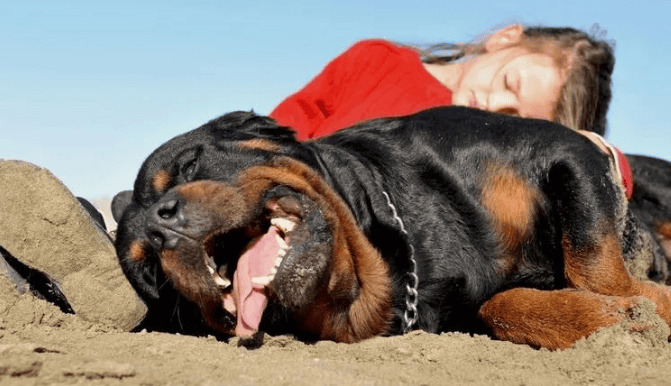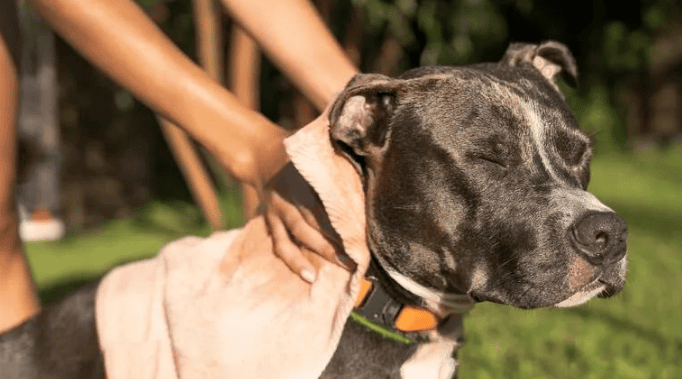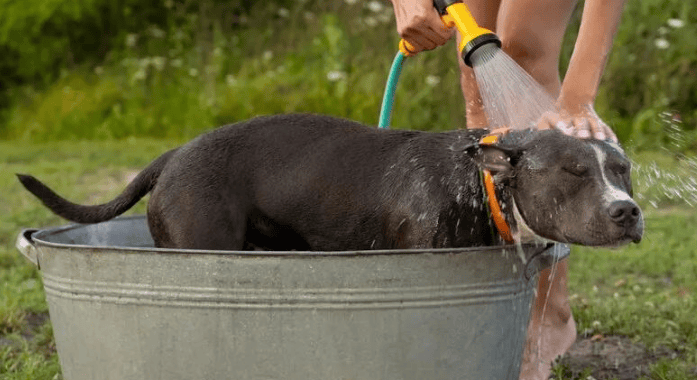Pit bulls are usually very loyal to their owners. They are often described as brave, determined, friendly dogs who enjoy being close to humans. While they may have some negative reputations, in reality, they are usually very loyal, affectionate, and love being around their families. Of course, a dog's personality is also affected by genes, environment and breeding, so every dog may be different. So what exactly should you pay attention to when raising a pit bull?
Socialization
As a strong and intelligent dog breed, social training is particularly important for Pit Bulls. Through good social training, Pitbulls can gradually adapt to various environments and people, and avoid being aggressive due to fear or unfamiliarity. Socialization training should begin as a puppy and continue into adulthood. This training involves exposing the pit bull to a variety of people and animals, including strangers, other dogs, and animals. By gradually increasing the frequency and scope of social contact, you can help your Pit Bull build good social skills and confidence, thereby reducing its fear of unfamiliar environments and people, and reducing the possibility of aggressive behavior.

Training
Pitbulls As an intelligent and sensitive breed, firm and positive training methods are required. Avoid using violent or oppressive training methods to avoid stimulating aggression. Positive training methods include rewarding good behavior, establishing positive interactions, and building trusting relationships. By rewarding positive behaviors, your Pit Bull will be more willing to repeat those behaviors and develop good habits over time. In addition, establishing a good interaction and trusting relationship with your pit bull can enhance its respect and dependence on you and reduce possible aggressive behavior. In short, using firm and positive training methods can help pit bulls establish good behavior habits and promote them to become friendly and loyal companions.

Exercise
Pitbulls It is a high-energy dog breed and therefore requires sufficient exercise to burn off energy and stay healthy. Regular walks, runs or play sessions are vital to their physical and mental health. Prolonged periods of inactivity may cause a pit bull to become restless or even exhibit destructive behavior. Therefore, owners should make sure to provide Pit Bulls with enough exercise time every day to satisfy their active nature. In addition, consider providing some mental games or training activities to help your Pit Bull burn off excess energy and maintain its physical and mental health. With regular exercise and activity, Pitbulls can stay healthy, happy, and exhibit better behavior and socialization.

Safety
Pitbulls Usually have a strong sense of territoriality and defensive instincts, so they need to provide a safe environment in the home to avoid conflicts with strangers or other animals. Hosts can provide a safe environment in several ways.
1) Develop social skills: Start social training when pit bulls are young, so that they can gradually become familiar with different people and animals, thereby reducing their tendency to attack strangers or other animals.
2) Proper socialization: Expose pit bulls to a variety of environments and situations, including different places, sounds, and smells, to help them adapt to various situations and reduce symptoms of fear or unfamiliarity Aggression.
3) Provide a safe space: Provide your pit bull with a safe, comfortable space, such as a dedicated bed or cage, where they can safely retreat and rest when needed.
4) Supervision and control: When strangers or other animals enter the home environment, the Pit Bull’s behavior must be monitored in a timely manner and measures must be taken to control its emotions and behavior to avoid conflicts.
5) Education and training: Through correct education and training, teach pit bulls correct behaviors and coping strategies, so that they know when to show defensive behavior and when to relax.
Through the above methods, owners can help pit bulls establish good behavioral habits and social skills, reduce the possibility of conflicts with strangers or other animals, and provide a safe and harmonious environment for the family.

Legality
Raising Pit bulls need to comply with relevant local laws and regulations, because some areas may have special requirements or restrictions for pit bulls. Pit bulls are generally considered a potentially dangerous breed, so some places may impose additional regulations on their care and management.
In some areas, pit bull owners may be required to register their pets and adhere to specific safety measures, such as the use of masks, insurance, and sign tags. In addition, some areas may impose restrictions on the number of pit bulls kept and their outdoor activities to ensure public safety.
In order to comply with local laws and regulations, pit bull owners should keep abreast of and comply with relevant regulations and ensure good socialization and training to reduce potential dangers. At the same time, owners should also pay attention to the behavior and health of the pit bull and take timely measures to deal with any potential problems to ensure the safety of the pit bull and the surrounding environment.
By complying with local laws and regulations, and providing a good breeding environment and management, pit bull owners can ensure the safety of themselves and others while providing a healthy and happy living environment for their pit bulls.
Health
Taking your pit bull for regular health checkups is an important step to ensure that it is in good health. Regular health check-ups can identify potential health problems early and enable appropriate treatment. In addition, pit bull owners should also pay attention to the following aspects.
1) Diet management: Provide pit bulls with balanced and nutritious food and avoid overfeeding or bad eating habits. Make sure your Pit Bull is eating a healthy diet by regularly checking food for freshness and suitability.
2) Weight control: Monitor the Pitbull’s weight regularly and adjust diet and exercise as needed to ensure it remains within a healthy weight range. Obesity increases a pit bull's risk of disease, such as joint problems and heart disease.
3) Avoid genetic diseases: Pit bulls are a breed prone to genetic diseases, such as avascular necrosis of the femoral head (HD) and heart disease. When purchasing a pit bull, choose a healthy dog and have regular health exams to monitor for potential genetic diseases.
Through regular health check-ups, proper dietary management and weight control, and avoiding problems such as genetic diseases, pit bull owners can ensure that their pit bulls are in good health and enjoy a healthy and happy life. Life.
Responsibility
Keeping a pit bull requires a strong sense of responsibility, as this breed is often considered a potentially dangerous breed and requires extra attention and management. . Providing adequate love, attention, and training is critical to a Pit Bull's growth and behavior to ensure that it can better accompany its owner and prevent them from harming others.
In the end, emphasize that pit bulls are a unique and popular dog breed that require special attention and care. Raising pit bulls requires comprehensive consideration of their training, socialization, health and safety needs. Only with adequate care and guidance can they become loyal and friendly companions. At the same time, people are also reminded to abide by local laws and regulations, and have clear planning and responsibility for raising pit bulls, so that this unique dog breed can be better recognized and understood in human society.

 扫一扫微信交流
扫一扫微信交流
发布评论